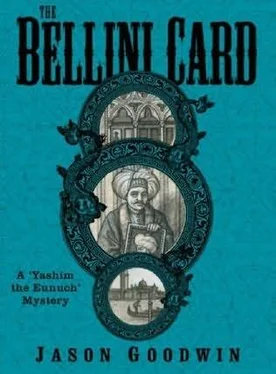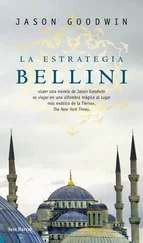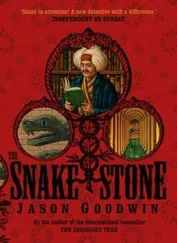Jason Goodwin - The Bellini card
Здесь есть возможность читать онлайн «Jason Goodwin - The Bellini card» весь текст электронной книги совершенно бесплатно (целиком полную версию без сокращений). В некоторых случаях можно слушать аудио, скачать через торрент в формате fb2 и присутствует краткое содержание. Жанр: Исторический детектив, на английском языке. Описание произведения, (предисловие) а так же отзывы посетителей доступны на портале библиотеки ЛибКат.
- Название:The Bellini card
- Автор:
- Жанр:
- Год:неизвестен
- ISBN:нет данных
- Рейтинг книги:5 / 5. Голосов: 1
-
Избранное:Добавить в избранное
- Отзывы:
-
Ваша оценка:
- 100
- 1
- 2
- 3
- 4
- 5
The Bellini card: краткое содержание, описание и аннотация
Предлагаем к чтению аннотацию, описание, краткое содержание или предисловие (зависит от того, что написал сам автор книги «The Bellini card»). Если вы не нашли необходимую информацию о книге — напишите в комментариях, мы постараемся отыскать её.
The Bellini card — читать онлайн бесплатно полную книгу (весь текст) целиком
Ниже представлен текст книги, разбитый по страницам. Система сохранения места последней прочитанной страницы, позволяет с удобством читать онлайн бесплатно книгу «The Bellini card», без необходимости каждый раз заново искать на чём Вы остановились. Поставьте закладку, и сможете в любой момент перейти на страницу, на которой закончили чтение.
Интервал:
Закладка:
“Hello!” Palewski said, sliding another picture from the sheaf. “Here’s Barbieri!”
99
The Tatar was moving away from him through the dark water. Yashim guessed that he’d been hurt in the plunge-winded, certainly.
Perhaps, too, the Tatar had lost his knife.
Perhaps the advantage had shifted to him.
The water was not especially cold, and Yashim was lightly dressed: the Tatar had several yards’ start on him.
Yashim watched him swim across the mouth of a small canal; on the other side he began to move faster against the canal wall, scrabbling like a bat, using the brick foundations of the next palazzo as handholds.
Yashim plunged across the canal and followed suit. Now he could hear the man’s breath and the splashes as he lunged through the water. In the moonlight he was a dark shape against the wall.
At the next corner the Tatar swiveled left and disappeared.
Yashim kicked off warily from the wall and circled the corner.
The Tatar was nowhere to be seen. The canal was a dark chasm, but as Yashim bobbed in the water a distant light flicked on and off.
Yashim was puzzled, until the moonlight picked out the faintest outline of a low crenellated barrier across the mouth of the canal. Now and then, he remembered, the authorities would close a canal for dredging.
He swam cautiously to the far side of the barrier, the knife in his hand. When he touched the rough wood he held his breath, pressing his back against the masonry wall.
Had the Tatar climbed the barrier already? Or was he on Yashim’s side, waiting in the dark?
Yashim groped for the top of the thick plank. It was about eighteen inches above the surface. He slid the knife back into its pocket and in one smooth motion he hauled himself up.
The canal beyond was dredged and empty. The canal bed glinted at his feet, about ten feet below. The Tatar was nowhere to be seen.
Yashim swung his legs over the barrier and dropped down into the soft mud.
100
Yashim inched himself gingerly along the wall: the mud was over his feet, mixed with chunks of broken bricks and stones. It churned over at every step, releasing a noxious belch of putrefaction. It occurred to Yashim that the whole city was built on rot. Sodden pilings, rotten brick, the submerged miasma of the lagoon’s decay.
The canal bed was lower in the middle, a shallow V that sloped up toward the buildings on either side. It was scarcely twelve feet wide. Overhead were the doorways that gave access to the water, too high, as Yashim judged, to reach, the walls below smooth with accumulated slime.
He placed his weight against the wall. His hand skimmed across the slippery algae and he overbalanced, clawing for a moment at the stones before he slithered down into the base of the trench.
The mud was thicker here, the water up to his knees. The effort of raising one foot only drove the other deeper into the cloying ooze. Yashim swayed, hands outstretched, surprised by the clutch of the mud around his ankles.
The Tatar struck like a crocodile in the swamp, slithering upward from the water-lined trench.
He swarmed up Yashim’s legs from behind, judging it well, scarcely pressing his feet to the canal floor. As Yashim sprawled the Tatar was on top of him, his hard fingers grasping for Yashim’s neck, his whole weight pressing Yashim’s shoulders down into the stinking trench.
Yashim barely had time to grab a lungful of air before he was facedown in the mud, his knees pressed into the thick slime. He fought an impulse to choke.
Dimly, he thought that the mud had caught him, more dimly still, that the mud might save him.
Thrusting against the splayed weight of his left leg, Yashim rifled to break the Tatar’s hold. His arms swung free. He thrust himself up for air and when he splashed back into the water he took the Tatar’s knees in his hands and shot himself backward, barreling like a rifle bullet between the Tatar’s legs.
For centuries, the Ottoman Turks had practiced a unique form of wrestling in which two men, oiled from head to toe, grapple with each other under a blazing sun. Fierce as these contests are, they are generally friendly. Punching is not allowed.
But in Venice, in the mud, Yashim and the Tatar fought beneath a cold moon.
Yashim took the man’s topknot in his fist, but as it slithered from his grasp he raised his knee sharply and drove it against his throat. The Tatar gave a gurgle, and Yashim thrashed back again, scrambling in the watery trench for purchase.
The Tatar was up to his waist in the water, kneeling: a figure of clay. Yashim reached for his knife, blessing the ignorant cook who had once bound the handle with a spiral of cord. Even in this slime his grip was sure.
The Tatar lurched to his right, trying to scramble out of the trench and up the side of the canal.
Yashim put his thumb over the top of the handle, like a stopper, and staggered toward his prey.
Sometimes the Tatar slipped and slithered back, sometimes Yashim. Once, he almost had the Tatar in his grasp, one hand around his ankle, the other stabbing blindly into the mud; then the Tatar kicked down savagely and both men skittered backward. The Tatar stopped short of the trench. He was on all fours, clambering higher, while Yashim thrashed out of the water below him.
The Tatar saw the rope first. Perhaps he had known it was there all along, a possibility of escape, hanging down in a lazy swag from a doorway high overhead.
Before Yashim could squirm out of the trench, the Tatar had made a grab for the rope. His hand slipped off, he staggered. But he regained his balance in a moment, and this time he managed to worm his forearm over the rope, using his elbow as a fulcrum, maintaining his hold by taking his other hand in a butcher’s grip.
Yashim approached warily: his fixed hold gave the Tatar an advantage.
The Tatar swung from the rope like an ape, and his foot caught Yashim in the belly-not a winding blow, but enough to knock him down.
When he struggled to his feet, the Tatar was already cradling the rope, and then he was upright against the wall, standing precariously in the loop, his hands groping overhead for the lintel of the doorway.
Perhaps Yashim could have flung his knife, in the hope that it would strike its mark. Perhaps he could have struggled up the bank again, made a lunge for the assassin, forced him back into the mud, to start the whole weary, heavy, uncertain process of execution over again.
But Yashim was tired. He was weighted with mud: wet, wounded. His ear was bleeding.
By the time he reached the rope himself, the Tatar had vanished.
101
Yashim found himself at the mouth of a narrow alley, barred by a few planks to stop pedestrians from falling into the dredged canal.
He climbed over the barrier and peered into the gloom. The usual weak light burned at the farther end of the alley. Yashim squatted and thought he could just make out the outline of muddy footprints.
At the corner he paused to scan the ground, but the footprints were by now invisible. There were at least three directions the Tatar could have taken.
Yashim leaned against the wall and tried to think.
Somewhere in this city the assassin had a safe place. Somewhere he could sleep, and eat, and leave at will, sure of attracting no attention.
He would have gone there now. Wounded and disarmed, he needed somewhere to change his clothes, wash his wounds. The Tatars were not punctilious about washing, unlike the Turks, but they would clean a bleeding cut.
Yet Venice was a poor city: and the poor are many, and have eyes.
They would see a stranger, even a careful one. Yashim had spent time in the Crimea, the Tatars’ homeland. He knew how they lived in the saddle on a handful of dried meat, but the Tatar would have to draw his water from a well, out in the campo. That was the way Venice was built. Some cities clustered around a citadel, but Venice shaped itself around its wells.
Читать дальшеИнтервал:
Закладка:
Похожие книги на «The Bellini card»
Представляем Вашему вниманию похожие книги на «The Bellini card» списком для выбора. Мы отобрали схожую по названию и смыслу литературу в надежде предоставить читателям больше вариантов отыскать новые, интересные, ещё непрочитанные произведения.
Обсуждение, отзывы о книге «The Bellini card» и просто собственные мнения читателей. Оставьте ваши комментарии, напишите, что Вы думаете о произведении, его смысле или главных героях. Укажите что конкретно понравилось, а что нет, и почему Вы так считаете.












